2nd Year
MONTHS
23-24
2nd Year – Months 23-24
Help Your Toddler by Listening and Answering Their Questions
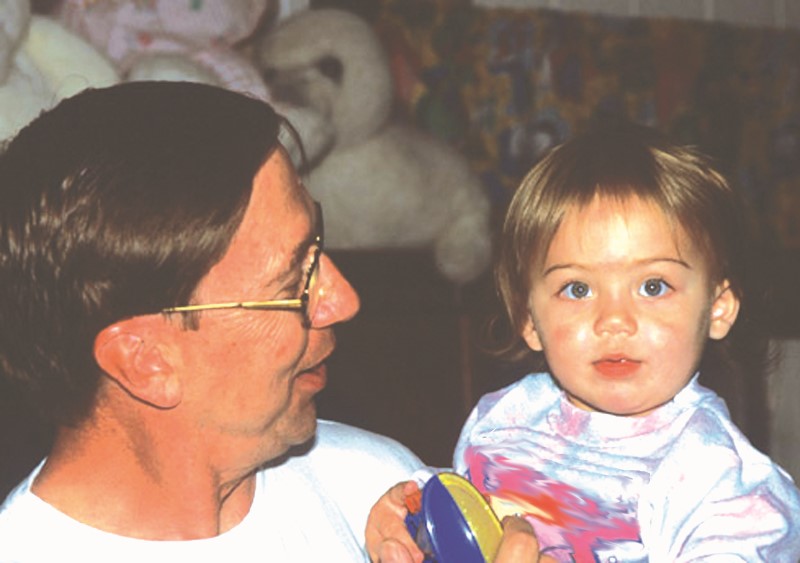
One of your most important jobs is to help your child understand who they are and help them feel capable of doing things for themself. A child begins very early to form either positive or negative pictures of themself.
You can help your child feel capable by:
- Telling them that you like who they are and you like the way they do things. Let them know when you think they do a good job.
- Use smiles as well as words. Thank them for hanging their towel up.
- Tell your child what to do — rather than what not to do. Instead of saying, “Don’t carry the cat that way” say, “Carry your cat like this.” That helps them learn how to do things the right way.
- Listen carefully. Take time to understand their feelings, joys, and fears. You are showing them that their ideas and feelings are important. All this will help them to feel valued and capable. You are helping them become the responsible, successful person you want them to be.
What Is It Like to Be 23–24 Months Old?
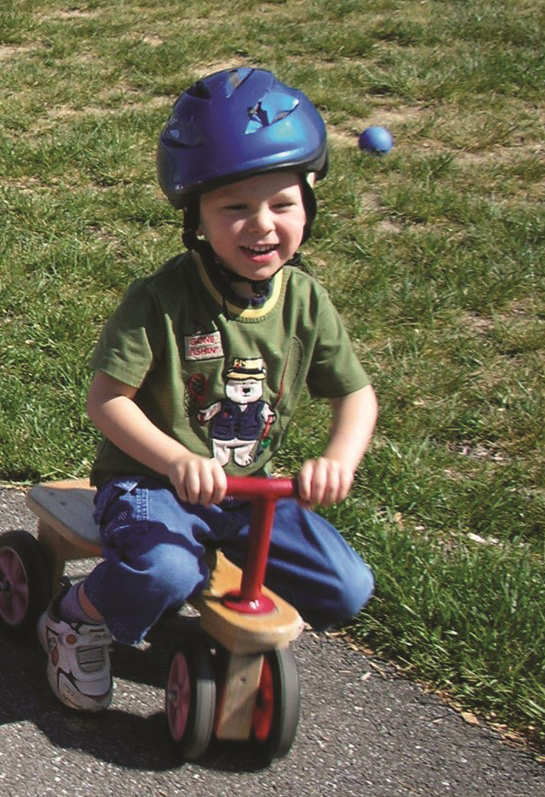
What I Can Do Myself
- I can take off all my clothes and I can put most of my clothes back on.
- I like to unwrap packages.
- I know what a toilet is, but I may not want to use it yet.
- I can turn doorknobs and open doors. Keep dangerous things out of my sight and out of my reach.
- I want to do a lot of things myself.
How I Talk
- I ask questions just to keep you talking with me.
- I can answer some questions, such as “What is your name?” “What does the dog say?” “What does the cat say?”
- I can name many things that I see often, such as things in my house, my preschool, or neighborhood.
- I’m learning the meaning of “soon” and am learning to wait.
- I can ask for food and drink.
What I Have Learned
- I can sit and “read” picture books, turning the pages for myself.
- I can put together a puzzle of three to six pieces.
- I know pretty well where things are located in and around my house.
- I can make a tower of eight blocks.
How I Get Along with Others
- I still don’t understand sharing, but I like to be with other children sometimes.
- I like to please others.
- I am interested in babies and their mothers.
- I am afraid of rejection.
- I like to order other people around.
- I sometimes show my anger by slapping, biting, and hitting.
- I want my way in everything.
- I am sometimes stubborn, and I use words like, “It’s mine,” “I don’t like it,” “Go away,” “I won’t,” and “No” a lot.
Play I Enjoy
- I like to play simple chase games like tag.
- A teddy bear or soft doll is still my favorite toy.
- I like to take things apart and put them together. Watch out that I don’t play with small pieces that could choke me.
- I can stack five rings on a peg toy in the right order.
- I like to be pushed on a swing.
- I play happily with soft play dough.
How I Grow
- I can pedal a small tricycle.
- I like to run more than I like to walk.
- I like to walk on low walls while you hold my hand.
- I can walk a few steps on tiptoe.
- I might be afraid of the noise of trains, trucks, toilet flushing, and the vacuum cleaner. I might also fear rain, wind, and wild animals. Be patient with me.
Some children do things earlier or later than described here. Most differences are normal. Focus on what your child can do and get excited about each new skill. If you notice that your child is lagging behind in one or more areas for several months, use this list to talk with your doctor about your child’s development.
Even Super Parents Have Children Who Misbehave
Parents often think they aren’t doing a “good” job if their children don’t act the way they “should.” No matter how good you are as a parent, your child will misbehave. If you feel responsible for all of your child’s misbehavior you will feel stress. That stress is hard on you and can cause you to be hard on your child. This will make things worse for both of you.
- Think positive. Instead of putting yourself down, try to give yourself some helpful messages. For example, sometimes parents think, “If I were a good parent, my child wouldn’t be having so many tantrums.” How about telling yourself and your child, “We got through that trip to the store without any fussing at all!”
- No one is perfect. Young children need parents who try their best, but that doesn’t mean we can succeed 100 percent of the time. We all make mistakes. When you’re not feeling OK, try your best, but don’t worry that you are not a super parent. Give yourself and your child credit for the good times and remember that nobody is perfect.
Make a Shape Board and Match Things That Are Alike
Your toddler will learn how to match objects that are alike. These kinds of games help them do better in school later on.
Materials
- Cardboard sheet about 8½ by 11 inches
- Crayon
- White paper
Making the Toy
- Draw simple shapes like a circle, a square, a triangle, and a star on the cardboard. Color each shape with one crayon.
- Then draw, color and cut out the same matching shapes from white paper.
Playing
Show your child how to match the cut-out shapes to the shapes drawn on the board. Talk about the pieces, naming their shapes. Ask your child to put the star on the star, the circle on the circle, the square on the square, and so on.
Remember, play this and any game only as long as it is fun for both of you. Praise your child’s efforts; do not point out their failures.
Answer Your Child’s Questions about Differences in Boys and Girls
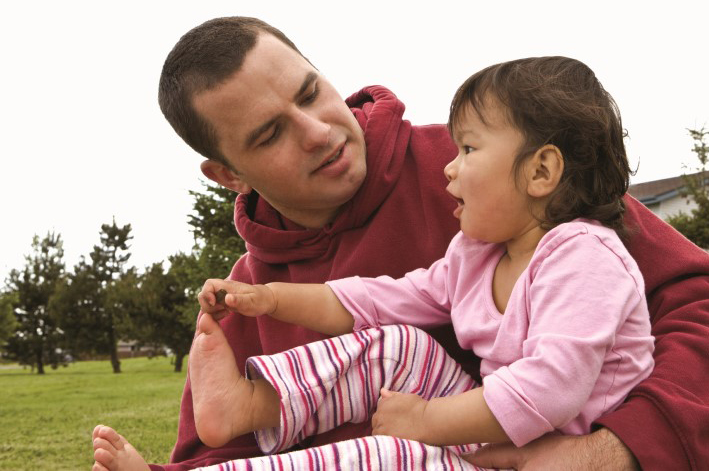
Your toddler is learning fast. You love their curiosity and you want them to ask questions because you know it means they are learning. Do you listen to their questions about sex?
Your toddler will have questions about where babies come from and why boys and girls look different from each other. Sure, these questions can be embarrassing, especially when they come when you are in public.
Whenever you see your little one wondering about sex, you have a good chance to help them. You can show your toddler you like their curiosity and you want them to learn about all kinds of things, including sex.
If you can talk to your child now about sex, it will be much easier for both of you to talk about it later. As they grow, the way they think and act about sex will become more important to them and to their relationships with others.
Your toddler will wonder about babies and where they come from. Tell them the truth in words that they know — something like “Babies grow in a special place inside the mother’s body.” Show them you are glad they asked the question. If they ask how babies get inside the mother, you may simply say that, “Babies are made by mothers and fathers together.” You could explain that the father’s sperm comes into the mother through the father’s penis.
Your child’s early questions about sex may be about the differences between men and women.
- Little girls may wonder why they have no penis; boys may worry that they could lose their penis. You can help your child learn that boys and girls are born with different genitals or private parts.
- Your toddler should know the correct names for their body’s sexual parts. Teach them these as you teach them the names of other body parts.
All young children handle their genitals. Most children like to explore all parts of their bodies. When they handle their genitals and find that this feels good; they may rub them. They may rub them when they feel bored or upset.
Some exploring of genitals does no harm. It is normal and it is best for you to ignore it. If you try to stop it and tell your children that they have done something wrong, they might think that sex and sexual feelings are bad. Just re-direct them and get them interested in playing with a toy or playing a game with you.
Two Year Olds May Bite
Sometimes, when young children play together, they push, hit, slap, or bite. Biting and forceful hitting must be stopped right away. Most children bite and hit when they are feeling angry or frustrated. When your little one bites you or another child:
- Say firmly, “No. Biting hurts.”
- Move them to a safe place; look them in the eyes and say, “Stay here until you feel calmer. I cannot let you bite.” After a minute or two (never more than two minutes), ask them if they are ready to play again without biting or hitting. If they say yes, let them return to their play.
- Never bite or hit your toddler back. This does not stop the biting. In fact, it may make them believe that biting is all right.
- Most children who bite only do it for a short time.
Hitting may continue for a longer time than biting. Help your toddler learn better ways to handle their anger.
- Teach them to use words like “Stop that,” “Go away,” “I don’t like that” instead of hitting and biting.
- When your little one uses words instead of hurting someone, praise their with words and hugs and say, “You did a good job of using words instead of hurting.”
As your toddler learns to say their feelings in words, the hitting and biting will decrease.
Toilet or Potty Train Girls at about 2 Years Old, Boys at about 2 ½ Years
Many girls are ready for toilet training or potty training at about age 2. Most boys are ready at about 2 ½ years. Boys and girls differ in their development at this age. Don’t rush toilet training.
When you think your child is ready to be trained to use the toilet:
- Teach your child the words they need to ask to go to the toilet. A good time to do this is when you change their diaper. Tell them why you are changing them. “You urinated and made your diapers wet” or “You had a BM or bowel movement.” Show them and tell them the word for the toilet or potty chair you will want them to use. Some children will let you know when they need to go to the toilet by saying the words, pulling your hand, or tugging at their diaper.
- When your child is ready for training, it helps to dress them in loose-fitting training pants that can pull off easily.
- When your child shows they want to go to the toilet, sit with them at least the first few times.
- Don’t give them toys to play with.
- Don’t insist that they sit on the toilet when they want to get off, even if they have not “done” anything.
- Always praise for successes by saying things like, “You made it to the potty!” Don’t punish accidents.
Bedtime Talks Are Comforting
You might enjoy starting a bedtime talk as part of your bedtime routine with your toddler. Bedtime is a good time to talk to your toddler in a cozy, private place.
- Review the best things that have happened that day and talk about plans for tomorrow. The sound of your soft comforting voice will help your child ease into sleep.
- You’ll probably find yourself doing much of the talking at first, but you’re setting the stage for later talk. As your child grows, they’ll want to have private talks with you about important things. You are practicing for these conversations with your bedtime talks.
Some nights you may be in a hurry and skip your talk. Don’t be surprised if your child says “You forgot to talk to me about today and tomorrow.”
Toddlers Will Test Their Independence and Power by Saying No
Sometime between 15 and 24 months, toddlers may become resistant and defiant. You will probably hear “no” a lot. All this is perfectly normal. Toddlers are more aware of their individuality and more able to do things for themselves. They may do this by being negative —but this is a sign that they are growing up.
- Make a few good rules – but not too many. Make rules that your toddler can understand and follow.
- Explain in simple words why you have the rule. Say something like, “You always hold my hand when we cross the street so I can keep you from being hurt.” This helps your toddler learn that there is a reason behind the rules.
- Children follow rules better when they know the reasons for the rules.
Teach Your Toddler Colors
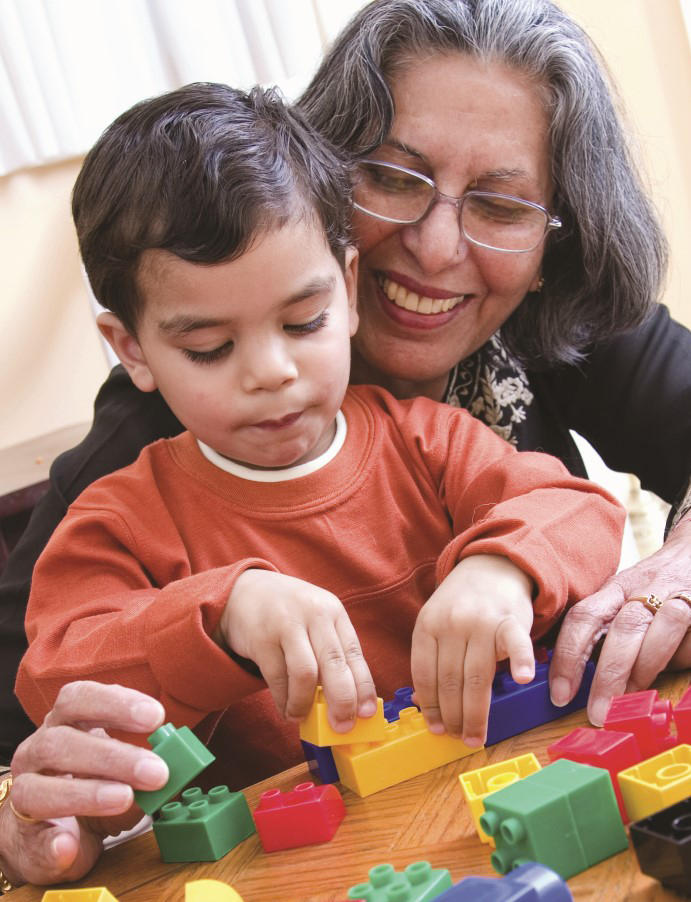
One of the best things to teach your child is their colors. It’s easy to do. Just find objects of different colors and play the following game.
- Sit on the floor facing your child.
- Select five blocks or other objects of different colors. Place two blocks of different colors in front of your child.
- Point to a block and say, “This is red.”
- Ask your child to give you the red block.
- Ask your child to say the color of the block they handed to you.
- Use only two colors at a time, but change the colors. Start with blue and red together, and then switch to blue and green.
- Tell your child the name of the new color only. See if your child can remember the name of the other color.
Other Color Games
- Have your child tell you the names of colors in stoplights or on television, in magazines, or on signs.
- Put together different things that are of the same color and ask your child what is the same about them.
- Help your child use crayons or colored pictures to learn the names of the colors.
Plan Active Fun for the Whole Family
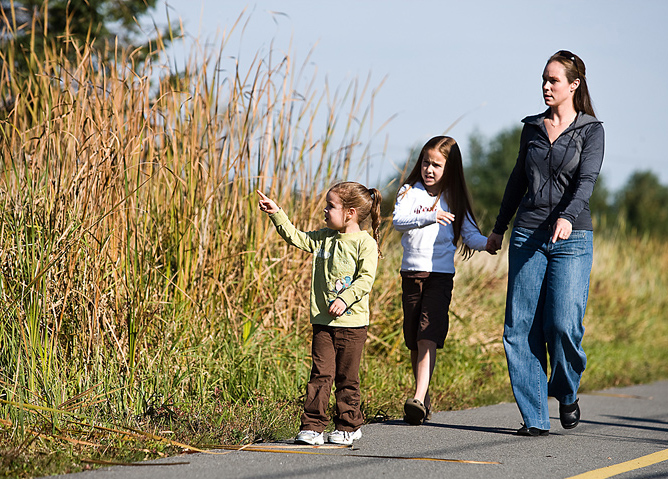
One great way to be sure your toddler is active is to build in time for physical activity for the whole family. Your child learns their attitudes about exercise from you. If you show them that it’s fun to be active, they are more likely to try it.
Here are some tips to make activity a fun part of your whole family’s life.
- Find places for active play. Yards, playgrounds, and parks provide plenty of room for your toddler to run. If you live in a cold climate, look for indoor recreation centers and playgrounds.
- Play with your child. Instead of standing by and watching while your child plays, join in by running or climbing with them.
- Fit it in. You don’t have to carve out one 60-minute block of activity time every day. Even short stretches of activity, such as a 10-minute game of tag, can help increase your family’s fitness.
- Turn off the TV. Children who spend a lot of time watching television are less likely to be physically active. Choose at least one day a week as “turn off the TV day.” Instead of watching TV that day, take a walk to the playground or roll a ball to each other.
- Try something new. Physical activity can get boring if you do the same old thing every day. Set up an obstacle course, and take turns climbing, crawling, and jumping. Take an afternoon hike or a weekend camping trip.
- Play simple games, but don’t worry about rules yet. Your child enjoys simple chasing games, and a game of tag can get their heart beating. Don’t worry about teaching the rules of tag; just enjoy it.
Help Your Child Learn to Like Healthy Foods
Most toddlers would be happy to just eat three or four favorite foods. For good nutrition, they need to learn to like a lot of different foods.
Fix many different kinds of food for your toddler — not just a few favorites.
Help them learn to like foods like milk, yogurt, cheese, fruits, vegetables, breads, rice, cereals, fish, chicken, meat, eggs, peanut butter, and beans.
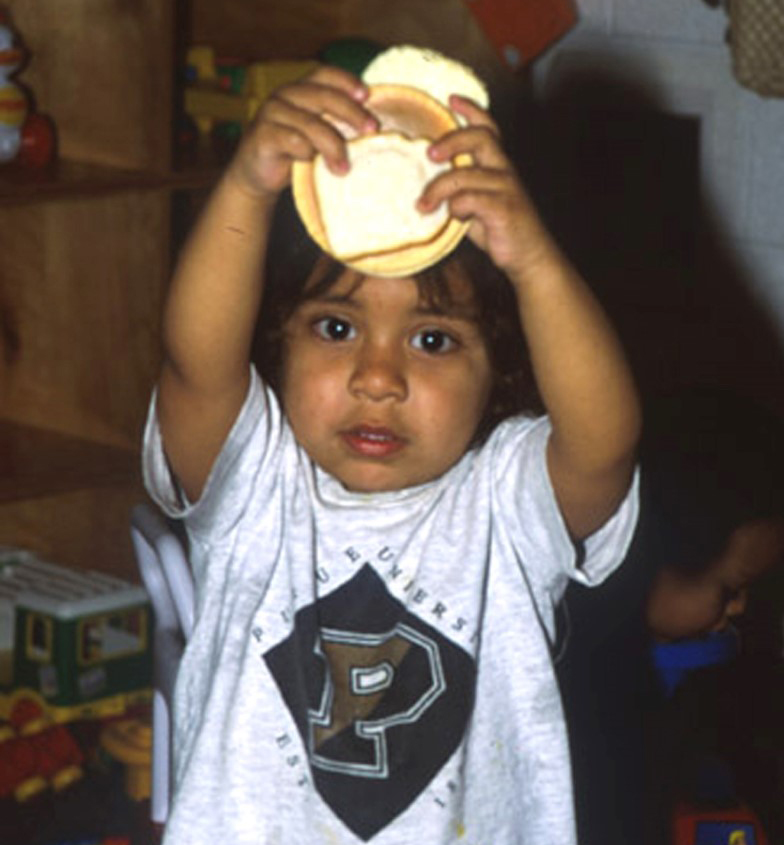
Talking with Your Toddler Helps Them Get Ready for School
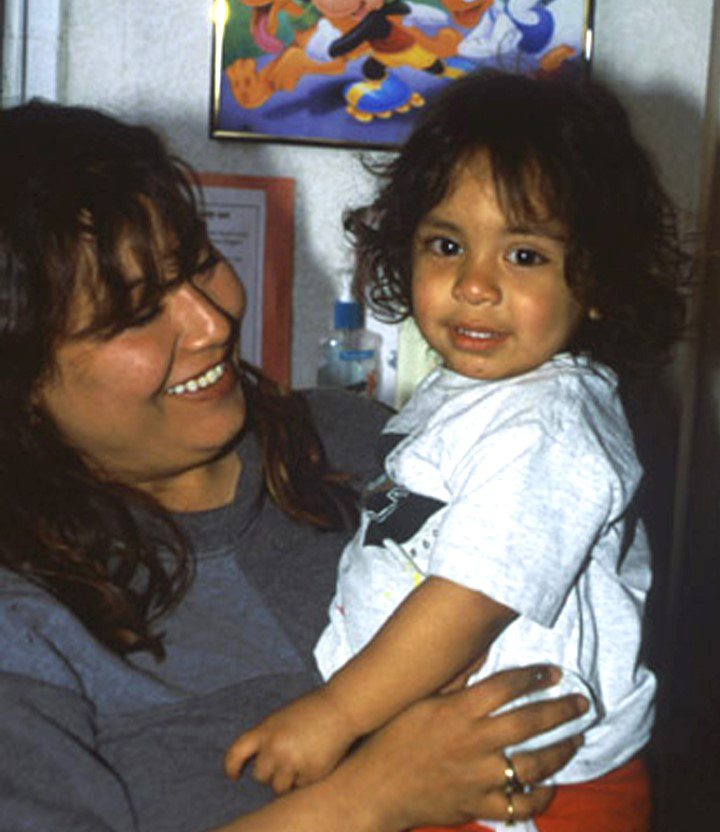
Parents and caregivers who talk with children —and encourage the children to talk with them—help children get ready for school success.
When parents talk to their children, they can say the names of things and describe in words what they are doing. Parents can also ask children questions about what they are doing. This is how children learn language and it helps them get ready to do well in school.
Reminders
Subscribe: If you are not already a subscriber, you can receive the newsletters direct to your email on your child’s birthday. Register at JITP.info (English) or (Spanish).
Every child is unique: When reading this newsletter, remember: Your growing toddler may do things earlier or later than described here.
Updates: We are constantly reviewing and updating JITP.info. See our current plans on the About Us page. Do you have questions or corrections? Email us at contact@jitp.info.
Credits: This newsletter is under review (2025) by YaeBin Kim (University of Nevada-Reno), Amanda Griswold (Wisconsin-Madison Extension), Silvia Vilches (Alabama Cooperative Extension), Brittney Schrick (Arkansas Extension) and Kelsie Jo Muller (Purdue University Extension).